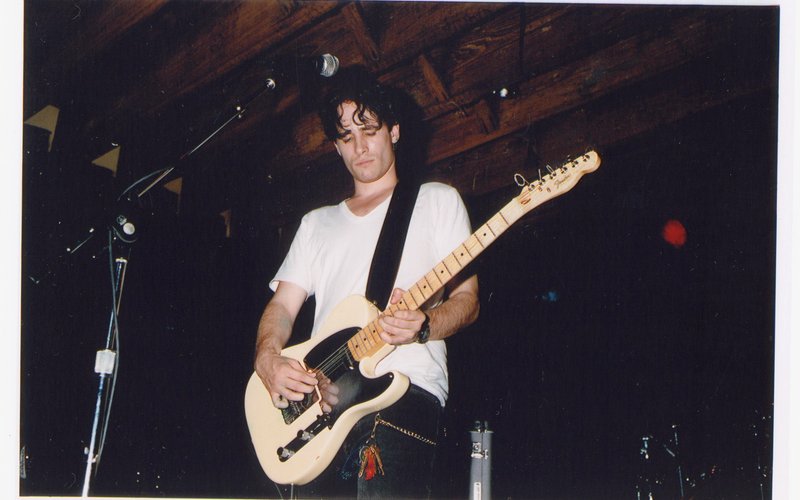
KEXP is celebrating our 50th anniversary this year, and we're looking back at the last half-century of music. Each week in 2022, KEXP pays homage to a different year, and our writers are commemorating a song from that year that resonates with them. This week, KEXP's Dusty Henry looks at Jeff Buckley's 1994 masterpiece 'Grace' and how "Lover, You Should've Come Over" might be his greatest artistic achievement.
Read or listen to the piece below.
For me, some of the most compelling musicians are those who release only one record, and that album is nothing short of an influential masterpiece.
It’s a rare club that includes the likes of Lauryn Hill, emo pioneers Rites of Spring, and of course, the Sex Pistols.
But there may be no better example of the one-album wonder than Jeff Buckley and his 1994 opus, Grace.
Jeff Buckley was the son of Tim Buckley, a singer-songwriter who fell into free jazz and developed a cult following of his own.
Tim was largely absent from his son’s life. Even though Jeff inherited the Buckley name and his father’s musical talent, he tried to keep his distance.
Despite that distance, Jeff’s music career really took off when he performed at a Tim Buckley tribute show in 1991 at St. Anne’s Church in Brooklyn. It was as poetic as it was cathartic, especially since Jeff covered Tim’s “I Never Asked to Be Your Mountain.” It’s a song that Tim wrote about his son.
Buckley began performing around New York. He landed a “residency” of sorts at a local Irish cafe called Sin-é. This is where Jeff Buckley’s Grace began to take shape. Performing solo with a clean electric guitar, Buckley workshopped his material and covered tons of Bob Dylan to Edith Piaf. Over time, Buckley’s style became an amalgamation of his influences — Nina Simone, Led Zeppelin, and Nusrat Fateh Ali Khan.
Buckley’s pristine, soaring voice booming out of Sin-è soon became the buzz of the town. Record executives began flooding the small cafe, with their limousines parked outside. It wasn’t long before Buckley signed a contract with Columbia Records.
Grace feels like an anomaly when you consider the biggest rock records of the time. Grunge continued its reign even after Kurt Cobain’s death. Soundgarden’s Superunkown dominated radio with fiery distortion. Oasis brought bravado back to arena stages with Definitely Maybe. And Nine Inch Nails continued to pave a way for industrial music to mainstream audiences with The Downward Spiral. In contrast, Grace was, well, more graceful.
Buckley had a tenacious scream to match the likes of Chris Cornell, and he wasn’t afraid to let loose when the moment called for it. But he also knew how to play to softer dynamics. Light, shimmering finger-picking beneath his siren falsetto. Buckley’s music felt romantic.
The tracklist on Grace includes Broadway standards like “Lilac Wine” and traditional hymns like “Corpus Christi Carol.” And, of course, there’s Buckley’s most famous cover. A rendition of Leonard Cohen’s “Hallelujah.” It became arguably his most famous and definitive song, this side of the Shrek soundtrack.
There’s a spiritual feeling across Buckley’s music that’s especially present in “Hallelujah.” A once-in-a-lifetime performance. How do you follow up that on an album? Why put that halfway through the album instead of at the end? Well, I’d argue that what comes next on Grace is Buckley’s real defining moment.
“Lover, You Should’ve Come Over” is an original composition that combines all of Buckley’s strengths into seven minutes of near perfection. The spiritual core of “Hallelujah” carries over as Buckley tenderly describes a funeral march. He’s also mourning the loss of love. Buckley was only 27 when he released Grace. With any other young artist, you might scoff at a line like “Too young to hold on / And too old to just break free and run.” But Buckley sells it.
“Lover” is the moment when Buckley rises to the heights of his idols. It’s sprawling, decadent, crestfallen. It finds the romance in despair.
Grace wasn’t an immediate hit when it came out. Eventually, it garnered acclaim from his heroes — musicians like Bob Dylan, David Bowie, and the members of Led Zeppelin.
Buckley was in the process of recording a follow-up in May of 1997 when he decided to take a swim in the Mississippi River, fully clothed with boots on. A roadie said he swam away singing Zeppelin’s “Whole Lotta Love” before he vanished in a wake, caused by a tugboat. His body was discovered a week later. He was just 30 years old.
A year later, Columbia Records compiled his final recording sessions. Even though Buckley had voiced dissatisfaction with those recordings, the label released Sketches for My Sweetheart the Drunk.
Jeff Buckley’s music still feels like a fever dream. I wonder a lot about what music he’d be making if he were still with us today. Still, it feels miraculous to know that an album like Grace exists.
KEXP is celebrating our 50th anniversary this year, and we're looking back at the last half-century of music. Each week in 2022, KEXP pays homage to a different year, and our writers are commemorating a song from that year that resonates with them. This week, KEXP's Martin Douglas looks back at vis…
KEXP is celebrating our 50th anniversary this year, and we're looking back at the last half-century of music. Each week, KEXP pays homage to a different year. This week, we look back at the tragedy and triumph behind The B-52s smash hit "Love Shack."
KEXP is celebrating its 50th anniversary as a radio station this year. To honor that celebration, each week we’re looking back on one year of music during the past five decades. This week, we’re celebrating the year 2003 with blink-182’s “I Miss You.” Dusty Henry reflects on teenage break-ups, and …